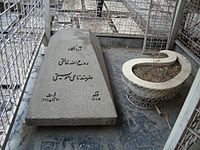This article has multiple issues. Please help improve it or discuss these issues on the talk page. (Learn how and when to remove these messages)
|
| Ruhollah Khaleqiروحالله خالقی | |
|---|---|
 | |
| Background information | |
| Born | 1906 Kerman, Iran |
| Died | 12 November 1965(1965-11-12) (aged 59) Salzburg, Austria |
| Genres | Classical, folk, traditional |
| Occupation(s) | Musician, conductor, violinist, songwriter, composer, professor |
| Years active | 1940–1965 |
| Formerly of | Delkash |
Ruhollah Khaleqi (Persian: روحالله خالقی, romanized: Ruhollâh Xâleqi, also spelled as Khaleghi; 1906 – 12 November 1965) was a prominent Iranian musician, composer, conductor and author.
He was the father of the first Persian women conductor Golnoush Khaleghi.
Education
Ruhollah Khaleqi was born in Mahan, a small town near Kerman, in a musically minded family. He first became acquainted with the tar, but later started to learn to play the violin.
As soon as Ali-Naqi Vaziri established his school of music, Khaleqi left school and joined Vaziri's school, where he studied for eight years. Soon he became his master's assistant and was placed in charge of teaching music theory.
He later continued his education and obtained a bachelor's degree in Persian language and literature from the University of Tehran.
Career

In 1944 Khaleqi established the National Music Society and in 1949, thanks his efforts, the School of National Music was founded. After his first journey to the Soviet Union in 1955, he became involved in the Iran-Soviet Society and was selected as a member of its board of directors.
He also began to serve as the director of the magazine Payām-e-Novin.

For many years Khaleqi worked as a musical advisor for Radio Iran and was one of the founders of the program known as Golhā (Flowers). He also conducted the Golhā Orchestra, for which he composed many pieces and revised the original compositions of his contemporaries as well as older masters, such as Aref Qazvini and Ali Akbar Sheyda. Although revised, the compositions retained all their original characteristics.
Khāleghi's compositions are not limited to what he wrote for Golhā.
Khaleqi established The National Music Society and Persian National Music Conservatory in 1949 in Tehran.
He believed Persian classical music must turn into a polyphonic music to become more attractive.
He died in 1965 in Salzburg, Austria and was buried in Zahir-od-dowleh cemetery, Darband, Tehran.
Musical compositions
In addition to such masterpieces as Mey-e Nāb (Pure wine), Āh-e Sahar (Sigh at dawn), Hālā Cherā (Why now?), and Chang-e Rudaki (Rudaki's harp), he composed many other lyrical pieces and hymns, which were mostly patriotic. These include such works as Ey Iran (famously performed by Gholam-Hossein Banan) and the Hymn for Azarbaijan.
Publications
His work, The History of Persian Music, which was published in two volumes, took shape during these years.
His other published works include: Harmony of Western Music, Theory of Eastern Music, and Theory of Persian Music.
See also
References
External links
- Ruhollah Khaleghi Artistic Center / Kanun-e Honari-e Rouhollah Khaleghi
- Listen to some editions of the Golha program from Ostād Javād Ma'roufi's Official Website
- 1906 births
- 1965 deaths
- Iranian composers
- Iranian conductors (music)
- Iranian tar players
- Iranian violinists
- Iranian music educators
- Iranian writers about music
- People from Kerman province
- Iranian classical musicians
- 20th-century conductors (music)
- 20th-century violinists
- 20th-century composers
- Iranian music historians
- 20th-century Iranian people